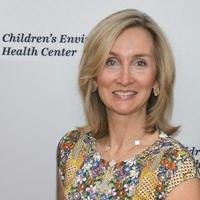Rhonda Sherwood: Advocating for Children’s Health
| Event Date: | December 9, 2014 |
|---|
Rhonda Sherwood (BSE IDE, ‘83) was among those who testified before Connecticut lawmakers in favor of the ban. She credits her engineering background for the ability to present scientific evidence to show the harm BPA poses to human health – especially in children.
“Giving testimony can be daunting, and then you’ll get a paid lobbyist to come and speak and they usually try to confuse the issue by mentioning chemicals that are not of immediate concern,” she says, “but sound science and peer-reviewed studies are always the way to get laws passed.”
Sherwood, whose maiden name is Rottschafer, displayed the perseverance needed to enact tough legislation back when she was a student at Purdue. After enrolling as a biology major with the intention of being pre-med, she quickly switched to the biomedical concentration in the Interdisciplinary Engineering program. (Before the current School of Biomedical Engineering opened, students interested in biomedical engineering were in Interdisciplinary Engineering). Despite the efforts of advisors and faculty members persuading her to consider another type of engineering, Sherwood says she made the right decision in line with her goals.
“I wanted to focus on healthcare,” she says. “That’s been the emphasis of my entire career as an adult. And I absolutely knew I did not want to deviate from the biology part, but I just wanted to understand more about technology as it relates to the science.”
Even though Sherwood was one of just a few females at the time in the Interdisciplinary Engineering program with a biomed focus, she forged ahead. She had the opportunity in her senior year to take a class taught by Dr. Leslie Geddes, who ran the biomed graduate program and would win the National Medal of Technology in 2006.
“It was a great degree for me, because when I decided not to go to medical school, I ended up getting a really terrific job in 1983, which was a horrible economy, with General Electric Medical System (now known as GE Healthcare),” she remembers. “It was an exciting time, because the MRI scanner just received Food and Drug Administration approval and GE was the leader in this field, so there was so much to learn.”
Sherwood left GE two years later to pursue an MBA full time from Northwestern University. That led her to a job with a consulting firm with clients like Dow Chemical and the petroleum industry. Wanting to get back into healthcare, she took a job with a venture capital firm which specialized in that industry. After her second child was born, she did some consulting work on her own, but eventually focused on raising her family full-time in the New York City area.
Back to Healthcare
When all three of her children were well into school, Sherwood found herself getting restless.
“I decided I needed to pursue my passion, which had evolved from my knowledge and love of healthcare, but also my upbringing. My mom and dad were health food enthusiasts,” she says. “After encouragement from friends, I thought a good idea would be to write a book. It was a cookbook, but really the intention was to guide readers on avoiding chemicals that could seep into their foods.”
That included warnings about nonstick surfaces, produce sprayed with pesticides, plastics that people stored their food in or cans that they purchased their foods and beverages in. Sherwood says she knew about such things from research and the fact that she, her two sisters and mother were always “absorbing this knowledge.”
A chance meeting with a businessman, with whom she had a mutual friend, resulted in her being offered the chance to form an organization for a famous doctor at Mount Sinai Medical Center in New York. The doctor – Philip Landrigan – studies the chemicals that she was trying to educate people on avoiding. Sherwood was named vice chairman of the executive board and served in that position for seven years.
“The three of us started the Mount Sinai’s Children’s Environmental Health Center and I offered to start a fundraiser, called Greening Our Children, which is still in existence today,” she says. “We just funded an over $4 million lab that’s going to analyze chemicals and air quality to determine what might be causing the increase incidence in diseases that we’re seeing in children today.”
The Senator Frank R. Lautenberg Environmental Health Sciences Laboratory honors the late U.S. senator from New Jersey. Lautenberg led the effort to require seatbelts in cars, ban smoking on airplanes, and in 2013 proposed the Safe Chemicals Act, among other pieces of safety legislation.
“I really think (this lab) is going to change the world,” Sherwood says, “because people are looking for answers as to why autism, ADHD and pediatric cancers, for example, have risen so dramatically just in a generation.”
Giving Back
The four years spent at Purdue, she admits, are among the best years of her life. So much so, that she plans to help the College of Engineering promote its programs in the Northeast in the coming years.
“The field of engineering is such a fantastic platform from which to build a career – especially from Purdue, which is so renowned for its engineering degrees worldwide,” Sherwood says. “It really adds a level of credibility that if I were another kind of major, I would not have.”

